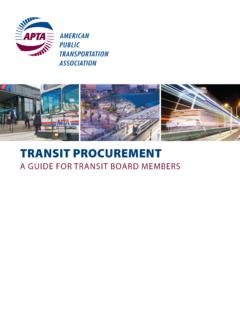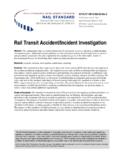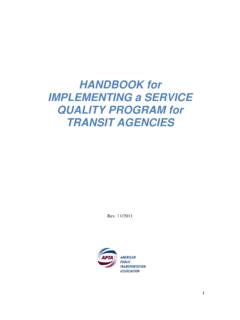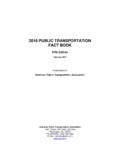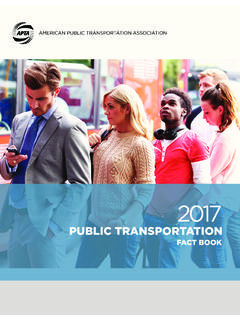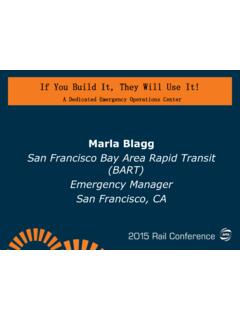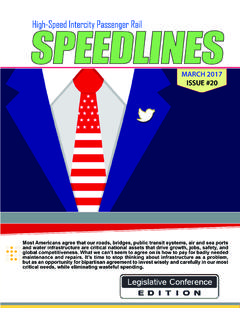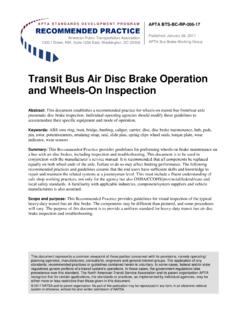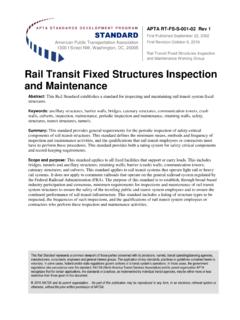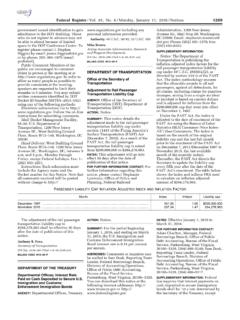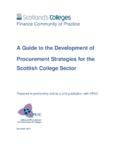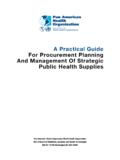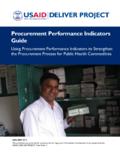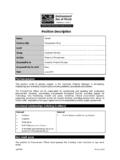Transcription of TransiT ProcuremenT - American Public …
1 TransiT ProcuremenTA guide for TransiT BoArd MeMBersintroduction 1 ProcuremenT Approval 2 Business Acumen 5 ProcuremenT Methods 7 The sealed Bid Process 11 The rfP Process 12other ProcuremenT issues 17 Additional information on the back coverTABle of conTenTsTransiT ProcuremenT : a guide for TransiT board members | 1 Effective procurements bring great value to TransiT agencies through cost effective contracts, smooth project rollouts, and goods and services that meet agency needs. This handbook is intended to help TransiT board members better understand the ProcuremenT process, their role in the process and the opportunities they have to improve the process. Carefully crafted ProcuremenT policies and supportive boards are critical to effective ProcuremenT .
2 Board members can help optimize the ProcuremenT function at their agencies by adopting policies that protect and support agencies and suppliers alike. Fair procurements and open communication among ProcuremenT participants facilitates appropriate pricing, healthy competition, legal compliance and pub-lic acceptance of ProcuremenT decisions. Specific areas where TransiT boards can boost ProcuremenT efficiency and effectiveness include: Advocating the use of simplified ProcuremenT methods and streamlined contract and change order approval processes, where appropriate, and empowering agency staff to approve certain procure-ment awards Applying business acumen to ProcuremenT development, evaluation and approval Encouraging staff to use more sophisticated negotiated procurements Encouraging state and local governments to amend laws to reflect current best practice Encouraging the use of APTA ProcuremenT standards and incorporating industry best practices into agency ProcuremenT policiesThe guide addresses each of these areas, providing an overview of issues to consider and recommenda-tions for action.
3 It also highlights other topics that often concern TransiT board that utilize federal funds for procurements must comply with federal ProcuremenT require-ments (FTA Circular ) and key in those requirements is that the ProcuremenT process provides for full and open competition. Agencies are also required to protect the integrity of the ProcuremenT process by adopting written standards of conduct that assure that employees, board members and oth-ers do not participate in the selection, award or administration of contracts if they have real or apparent conflicts of handbook was originally developed and distributed in 2003 by APTA s ProcuremenT Task Force. The work of the task force is now carried on by the APTA ProcuremenT Steering Committee which was created to support a stronger business environment in the Public transportation industry and to oversee the development of industry ProcuremenT standards.
4 The committee is comprised of members from the executive level of both TransiT agencies and industry suppliers, and includes the chair of the TransiT Board Members committee. APTA hopes that the handbook will help TransiT board members better understand the issues around TransiT ProcuremenT and provide a basis for ongoing discussion among the industry, Public officials and the Public we ProcuremenT Steering CommitteeocToBer 2010inTroducTion2 | American Public TrAnsPorTATion AssociATion The Federal TransiT Administration (FTA) does not require TransiT boards to approve contract actions. Boards are free to set their own policies and decide which contract matters require their oversight. State and local governments, however, may mandate board approval of certain con-tract awards.
5 As a result, ProcuremenT approval policies should reflect both current best practices and any requirements imposed by state or local laws. esTABlishinG A PolicyFactors to consider when determining which actions should be subject to board approval include: policy issues: Some contracts may involve policy issues important enough to require board approval. dollar value: Agencies should establish a minimum threshold that must be met to trigger board review. The costs of reviewing low-dollar actions typically outweigh the benefits. discretion: If there is little discretion in making an award such as in sealed bid con-tracts, submitting an action for board approval makes little sense.
6 Delays: The time required to schedule board approval of contract awards and issue contract change orders can increase costs, reduce supplier interest and impact the smooth administration of contracts. The benefits of a lengthy board approval pro-cess must be weighed against the potential costs of project delays. staff productivity: Preparing materials for board review can be time-consuming. By focusing only on actions that truly need board input and approval, TransiT boards allow staff to concentrate on other important tasks. ProcuremenT APProvAlFor every $1 invested in Public transportation, $4 in economic returns is ProcuremenT : a guide for TransiT board members | 3differenT AcTions, differenT needsBoard approval policies also should reflect the type of contract action under consider-ation.
7 Informal, low-dollar value procurements, sealed bids and requests for proposals (RFPs) may each need to be treated differently:informAl, low-dollAr vAlue ProcuremenTsMost agencies do not bring low-dollar value procurements to their boards for approval. Examples of such actions include obtaining one or more low value quotes for office supplies or oil filters. seAled bidsUnder FTA policy and most state and local laws, sealed bids (also called Invitations for Bids or IFBs) must be awarded to the lowest bidder that is both responsive and respon-sible. More specifically, this means that in addition to providing the lowest price, the winning bidder must: Offer what the agency specified Have the technical and financial capacity to successfully complete the work Have a satisfactory record of integrity and business ethics and a satisfactory current and past performance record Be in compliance with all other Federal, state and local requirements including DBE requirements, Public policy and not being suspended or sealed bids allow little discretion and generally do not involve policy issues requiring board oversight, some boards delegate approval authority to their General Managers.
8 The General Managers, in turn, may delegate it further, depending on the amount of the contract. These delegations eliminate the need to wait for the next monthly board meeting, allowing awards to be made more neGoTiATionsBoards often approve awards through a Request for Proposal (RFP) process, also known as competitive negotiations. The RFP process gives agencies the ability to discuss the proposal with proposers (which cannot be done with sealed bidding) and in addition to price, the qualitative differences in proposals can be considered. In some cases, dif-ferences in a company s project schedule, approach to the project or the personnel working on the project will differentiate which proposal provides the best value to the agency.
9 Or a proposed product may provide more durability during the life of the product and lower long term costs to the agency. Sometimes a higher-priced supplier may provide the most advantageous proposal for the agency, and under the RFP pro-cess they can be awarded the contract. If there are no policy issues to consider, some boards delegate approval of lower value to their General Managers. RFP awards that meet a certain minimum dollar value threshold or involve significant policy issues are almost always subject to board recommendations for RFPs should be brought to the board after the agency has reached an agreement with the recommended supplier. If an agency recommended an award before negotiations, proposers have far less or no incentive to negotiate a good deal.
10 Delays are an important factor to weigh in the ProcuremenT approval process. Particularly for large projects, suppliers may have project teams on hold, ready to go to work, and other project arrange-ments may be adversely affected if awards are delayed. Agencies that routinely delay projects may find less supplier interest or increased costs as suppliers add contin-gencies to account for anticipated delays. Canceling procurements, especially after suppliers have gone through the entire process, should not be done lightly. Firms spend significant resources on their proposals; costs can reach hundreds of thousands of dollars on large projects. In addition, suppliers risk exposing their pric-ing and creative thinking to competitors or its unintentional dissemination if the agency decides to issue a new solicitation that reflects the knowledge it acquired during the initial RFP.
